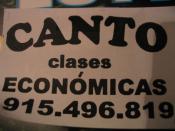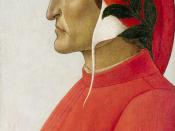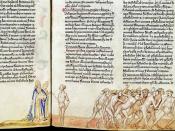To achieve true immortality in heaven, one must find a balance between using one's God-given talents and leading a virtuous life. Through the first twenty five Cantos, Dante is determined to focus only on his poetry and become the greatest poet of his time. However, he gains an insight (through his conscience) that one must moderate talent by virtue. In other words, he must also live a morally good life along with writing poetry to get to heaven.
There are a few small examples of Dante's hubris that sparks the tainted idea that talent is all that matters in life. His first invocation (II. 7-9) calls not only the Muses, but also his "lofty genius" and memory so that its "nobility be shown." He wants to instill in his readers the fact that they are about to read the greatest poetry. This shows the level of Dante's pride in the story he hasn't even told yet.
He adds to this pride when he is inducted into the circle of the great poets in Limbo (IV. 97-102). Conversing with the great poets gives Dante the impression that he automatically rises and meets the reputations of the five other poets. Since pride is one of the seven deadly sins, we can see that Dante's moral journey isn't off to a good start.
With this in mind, Dante's discourse with Brunetto Latini in Canto XV seems even more detrimental. However, his conscience catches him at the end of the Canto. Dante is encouraged to keep creating poetry for he is destined to be a great poet as Brunetto tells him (XV. 55-57). Here, Brunetto prophesies that Dante will surpass Lucan and Ovid, which turns out to be true since sinners can see into the future.
Brunetto also encourages Dante to keep writing in order to achieve immortality through art and a "second life on earth," as he describes it. Although Dante is deeply enticed by his mentor's words, he knows that something is amiss through his conscience. He realizes the irony of someone in hell giving advice on immortality and also recognizes that his conscience has to be functioning (XV. 91-93) and therefore should seek the virtuous path and follow God's will.
Much later in Canto XXIV, Virgil tells Dante to prepare for the ultimate in poetic talent, for he will soon surpass Ovid and Lucan in his writing. "Without fame, he who spends his time on earth leaves only such a mark upon the world as smoke does on the air or foam on water," as Virgil says (XXIV. 49-51). This advice seems strangely similar to that of Brunetto's. However, Virgil makes a clear distinction as to what the result of virtue and talent is.
Virgil says, "There is a longer stair that must be climbed." (XXIV. 55). The "longer stair" is the stairway to heaven. He also says that ungraced reason alone is not enough to get Dante to heaven. But denying talent does not mean accepting virtue. Only with the combination of the two can he get to heaven. Virgil urges Dante to use his God-given talents to show his goodness to the readers and not to fuel his pride.
However, Dante chooses not to heed Virgil's advice when he supersedes Lucan and Ovid in his descriptions in Canto XXV. Dante also seems to have forgotten what he learned through his conscience in the discourse with Brunetto. Clearly off the virtuous path, he wants to proclaim to the world that his poetry is better than the great poets'. His attitude towards his poetry is also immoral. He "apologizes" beforehand (XXV. 142-144) saying that he does not want to offend anyone if they find Dante's words imperfect and insulting. But Dante had many times before proclaimed his poetry flawless. So therefore he implies that he does not care for the feelings of those insulted by his words.
Over the course of the next Canto, which is believed to take some time, Dante undergoes a huge transition in his thinking. He says, "I curb my powers lest they run where virtue fails to guide them" (XXVI. 21-22). He reaches a new stage of insight and now sees exactly what he must do. He makes a resolution to turn towards virtue when using his poetic talent.
Dante expands upon this in Canto XXVIII in the first few lines, where he recognizes that his talent is limited. "Who, even in words not bound by meter... could tell the blood and wounds that I saw now?" (XXVIII. 1-3), he says. His conscience reminds him that talent alone would only result in earthly fame. Dante instead needs to focus on leading a virtuous and moral life as well because that is what truly matters in getting to heaven.
This idea is secured in Dante's mind with his second invocation of the Muses in Canto XXXII. Dante says, "But may those ladies who aided Amphion to build the walls of Thebes now aid my verse, that the telling to be no different from fact" (XXXII. 10-12). This invocation is similar to the invocation he made in the beginning of the Commedia, however, he does not call upon his genius or memory. This invocation contains no sense of pride and, therefore, is an indication that he has done the right thing. Dante reconfirms that talent alone is limited. He also acknowledges that he is not the greatest poetic mind of his time, because he asks for the help of a higher power ( or God's will) to aid him in the rest of the Commedia.
From here, we know that nothing can break Dante's determination to seek a virtuous life through use of his God-given talents. He has seen, first hand, how leading a life devoted only to talent can cause one to end up in hell for eternity. He now knows that one must not solely focus on talent or virtue, but only in a moderation of the two can one achieve eternal bliss in heaven.


